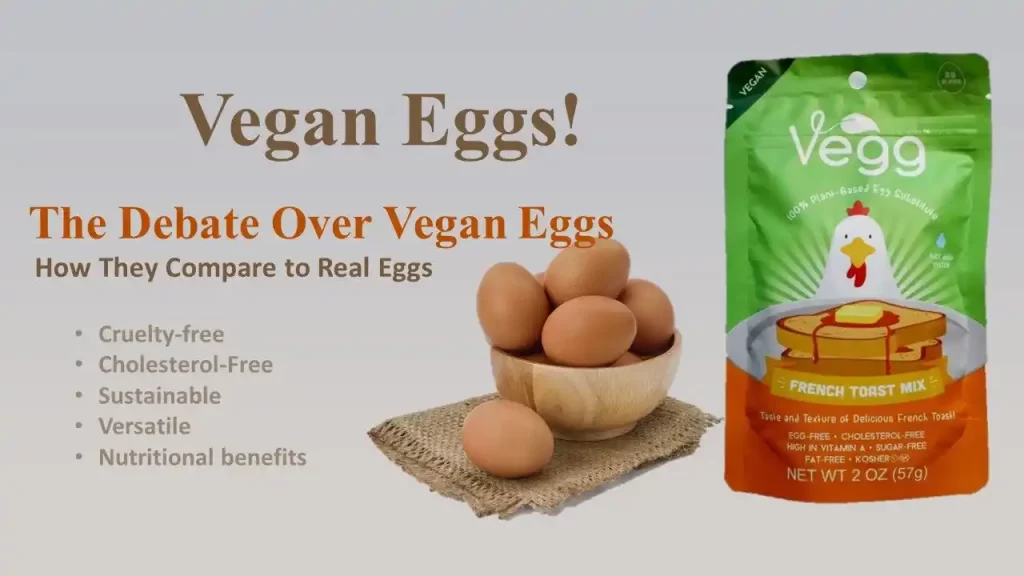Eggs are a staple food in many households, enjoyed for breakfast, lunch, and even dinner. They’re versatile, delicious, and packed with protein. However, with the rise of veganism and concerns over animal welfare and the environment, many people are turning to plant-based alternatives to traditional eggs. Enter vegan eggs – a new breed of egg substitutes that promise to deliver the taste and texture of real eggs without ethical concerns or health risks.
In this article, we’ll explore the debate over vegan eggs and traditional eggs, looking at the nutritional benefits, ethical considerations, and popular vegan egg brands and recipes.
Whether you’re a vegan looking for an egg-free option or simply curious about the alternatives, read on you will certainly learn something new.
What are Vegan Eggs?
Vegan eggs are a plant-based alternative to traditional eggs that are made from a variety of ingredients, such as legumes, soy protein, and other plant-based proteins.
These egg substitutes are designed to mimic the taste, texture, and appearance of real eggs, and they can be used in a variety of recipes in place of traditional eggs, including baking, cooking, and making scrambled eggs or omelettes.
One popular brand of vegan eggs is Just Egg, which is made from mung bean protein isolate and contains no cholesterol or artificial flavors. Another popular brand is Follow Your Heart VeganEgg, which is made from whole algal flour and contains no dairy or soy.
In addition to being a cruelty-free option, vegan eggs also have numerous health benefits. For example, they are lower in cholesterol and saturated fat than traditional eggs, and they can be a good source of protein, iron, and other essential nutrients.
Overall, vegan eggs are a great option for anyone looking to reduce their consumption of animal products while still enjoying the taste and versatility of eggs.
Ethical and Environmental Considerations
Choosing between traditional eggs and vegan eggs involves more than just nutritional considerations – there are also ethical and environmental factors to consider. Here are 3 key areas to explore:
Animal welfare
The production of traditional eggs often involves the confinement of chickens in small cages or overcrowded conditions, which can be harmful to their health and well-being.
Additionally, male chicks in the egg industry are often killed shortly after hatching, as they are not used for egg production.
By choosing plant-based egg substitutes, you can help reduce the demand for eggs produced in this manner and support more humane practices.
Environmental impact
The egg industry can be a major contributor to environmental problems such as pollution, deforestation, and greenhouse gas emissions.
For example, the production of chicken feed can lead to deforestation and habitat loss, while manure and other waste products can pollute nearby waterways.
Choosing plant-based eggs can help reduce the environmental impact of food production and support more sustainable practices.
Consumer choices
By choosing vegan plant-based eggs, you are supporting companies and practices that align with your values and beliefs.
This can be a powerful way to send a message to companies and policymakers about the importance of ethical and sustainable food production.
Why Do People Eat Vegan Eggs?
Plant-based eggs have become increasingly popular in recent years, as more and more people are looking for plant-based alternatives to traditional eggs. Here are five main reasons why people choose to eat vegan eggs:
Ethical concerns
Many people choose to eat vegan eggs for ethical reasons, as they do not contain any animal products or by-products. Veganism is a lifestyle that seeks to reduce animal exploitation and cruelty, and choosing vegan eggs is one way to contribute to this cause.
Health benefits
Vegan eggs are generally lower in cholesterol and saturated fat than traditional eggs, making them a healthier option for many people. Additionally, vegan eggs can be a good source of protein, iron, and other essential nutrients.
Environmental concerns
The egg industry can be a major contributor to environmental problems such as pollution, deforestation, and greenhouse gas emissions. By choosing vegan eggs, people can reduce their environmental impact and contribute to a more sustainable food system.
Allergies and dietary restrictions
Some people are allergic to eggs or have other dietary restrictions that make it difficult to consume traditional eggs. Vegan eggs are a great alternative for these individuals, as they do not contain any egg products.
Variety in the diet
Finally, some people simply enjoy the taste and versatility of vegan eggs. They can be used in a variety of recipes, from breakfast dishes to baked goods, and offer a unique and flavorful alternative to traditional eggs.
Overall, there are many reasons why people choose to eat ethical egg substitutes, from ethical and environmental concerns to health benefits and taste preferences.
Are Vegan Eggs Healthy?
Vegan eggs are generally considered to be a healthy alternative to traditional eggs, as they are typically lower in cholesterol and saturated fat. Additionally, they can be a good source of protein, iron, and other essential nutrients.
One popular brand of ethical diet eggs, Just Egg, contains 5 grams of protein per serving, as well as vitamins and minerals such as iron, calcium, and vitamin B12. Other brands, such as Follow Your Heart VeganEgg, also offer similar nutritional benefits.
However, it’s important to note that not all vegan eggs are created equal. Some brands may contain added sugars, oils, or other ingredients that can be unhealthy in large quantities. Additionally, plant-based egg substitutes may not be a suitable replacement for eggs in all recipes, as they may not provide the same texture or binding properties.
If you’re considering incorporating ethical choice eggs into your diet, it’s important to choose a high-quality brand and use them in recipes where they will work well as a substitute for traditional eggs. Additionally, it’s always a good idea to consult with a healthcare professional or registered dietitian to ensure that your diet is meeting all of your nutritional needs.
You May Also Read: Your Ultimate Guide to the Best Biodegradable Gloves: Top 9 Picks
Pros of Vegan Eggs
Plant-based egg substitutes offer numerous advantages over traditional eggs, from ethical considerations to nutritional benefits. Here are 5 pros of vegan eggs:
Cruelty-free
These ethical egg substitutes do not require the use of animals in their production, making them a more ethical choice for many people. This means that no chickens or other animals are harmed or exploited in the making of vegan eggs.
Lower in cholesterol and saturated fat
Vegan eggs are typically lower in cholesterol and saturated fat than traditional eggs, making them a healthier option for many people. This can help reduce the risk of heart disease and other health problems associated with a high-fat diet.
Sustainable
The egg industry can be a major contributor to environmental problems such as pollution, deforestation, and greenhouse gas emissions. Choosing vegan eggs can help reduce the environmental impact of food production and contribute to a more sustainable food system.
Versatile
Ethical egg substitutes can be used in a variety of recipes, from scrambled eggs to baked goods, making them a versatile ingredient in the kitchen. They can be a great option for people with allergies or dietary restrictions who still want to enjoy the taste and texture of eggs.
Nutritional benefits
Vegan eggs can be a good source of protein, iron, and other essential nutrients. Compared to traditional eggs, vegan eggs may contain higher levels of certain nutrients, such as vitamin B12. They can be incorporated into a healthy diet as part of a balanced meal plan.
Overall, plant-based egg substitutes offer numerous advantages over traditional eggs, from ethical and environmental considerations to health benefits and versatility in the kitchen. If you’re considering making the switch to egg substitutes, it’s worth trying out a few different brands and experimenting with them in different recipes to find what works best for you.
You May Also Read: 5 Top Picks: Your Ultimate Guide to Reusable Paper Towels
Cons of Vegan Eggs
While vegan eggs have many benefits, there are also some drawbacks to consider. Here are three cons of vegan eggs:
Processed ingredients
Many vegan egg substitutes contain processed ingredients, such as soy protein isolate, that some people may want to avoid. While these ingredients are generally considered safe, they may not be suitable for everyone.
Cost
Vegan eggs can be more expensive than traditional eggs, which can be a barrier for some people. However, the cost of vegan eggs has been decreasing as more brands enter the market and competition increases.
Texture
Some people find that egg alternatives do not have the same texture or flavor as traditional eggs, which can be a downside for those who are used to the taste of real eggs. However, this can be overcome with experimentation and finding the right vegan egg brand and recipe.
While vegan eggs have many benefits, they also have some drawbacks that should be considered before making the switch. It’s important to choose high-quality vegan egg brands that use whole-food ingredients and to experiment with recipes to find what works best for you.
Popular Vegan Egg Brands
There are several popular vegan egg brands available in the market. Let’s take a look at the most popular ones and compare their taste, texture, and cooking properties.
Just Egg
Just Egg is a popular vegan egg brand that is made from mung bean protein isolate. It is known for its ability to scramble like real eggs and has a similar taste and texture to eggs. Just Egg is also versatile and can be used in baking recipes such as quiches and custards. It is available in liquid form and comes in a bottle. Just Egg is widely available in most major grocery stores.
Follow Your Heart VeganEgg
Follow Your Heart VeganEgg is another popular vegan egg brand that comes in a powdered form. It is made from whole algal flour and does not contain any dairy or soy. VeganEgg has a texture that is similar to real eggs, and it can be used in scrambled eggs, omelettes, and baking recipes. It is also cholesterol-free and has a long shelf life. VeganEgg can be found in natural food stores and online retailers.
The Vegg
The Vegg is a vegan egg yolk substitute that is made from nutritional yeast and sodium alginate. It is primarily used for its ability to mimic the flavor and texture of egg yolks and is often used in recipes like hollandaise sauce and mayonnaise. The Vegg is available in powder form and can be found in natural food stores and online retailers.
In terms of taste and texture, Just Egg is known for its ability to closely resemble real eggs in both flavor and texture. Follow Your Heart VeganEgg has a similar texture to real eggs but may have a slightly different taste. The Vegg is primarily used for its ability to mimic the flavor and texture of egg yolks.
Where to Find and Purchase Vegan Eggs?
These vegan egg substitutes can be found in most natural food stores, as well as online retailers like Amazon and Thrive Market. Some major grocery stores also carry these vegan egg substitutes in their natural food sections.
Vegan Egg Recipes

Vegan eggs can be used in a variety of recipes, from breakfast dishes to baked goods. Here are a few popular vegan egg recipes to try:
Vegan Scrambled Eggs
Vegan scrambled eggs can be made using Just Egg, which closely mimics the taste and texture of real eggs. To make vegan scrambled eggs, simply pour Just Egg into a non-stick skillet over medium heat and stir frequently until cooked. Add in your favorite veggies, such as spinach or mushrooms, and season with salt and pepper to taste.
Vegan Omelet
Vegan omelettes can be made using Follow Your Heart VeganEgg. To make a vegan omelette, mix VeganEgg with water according to the package instructions. Pour the mixture into a non-stick skillet over medium heat and cook until firm. Add in your favorite veggies, such as bell peppers or onions, and fold the omelette over. Serve with toast or hash browns.
Vegan Quiche
Vegan quiche can be made using The Vegg, which mimics the flavor and texture of egg yolks. To make a vegan quiche, mix The Vegg with water according to the package instructions and whisk together. Add in your favorite veggies, such as broccoli or tomatoes, and pour the mixture into a pie crust. Bake at 375°F for 30-35 minutes or until golden brown.
Tips for Cooking with Vegan Eggs
Here are a few tips for cooking with vegan eggs:
Follow package instructions – Different vegan egg brands may have different instructions for preparation and cooking. Be sure to read the package instructions carefully to ensure the best results.
Use a non-stick skillet – Vegan-based egg substitutes can stick to the pan, so it’s best to use a non-stick skillet to prevent sticking and ensure easy cleanup.
Experiment with seasonings – Vegan egg substitutes may have a slightly different taste than traditional eggs, so it’s a good idea to experiment with different seasonings and spices to find what works best for you.
Add in your favorite veggies – Vegan eggs can be a great way to incorporate more veggies into your diet. Add in your favorite vegetables to scrambled eggs, omelettes, and quiches for a nutritious and flavorful meal.
Don’t overcook – Vegan egg substitutes can become rubbery if overcooked, so it’s important to watch them closely and remove them from the heat once cooked through.
You May Also Read: 7 Must-Have Zero Waste Kitchen Essentials for 2024
Conclusion
In conclusion, whether you’re looking to reduce your environmental impact, support ethical food production, or simply try something new, vegan eggs offer a delicious and versatile alternative to traditional eggs.
So why not give them a try? Your taste buds (and the planet) will thank you.

